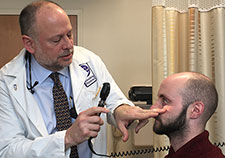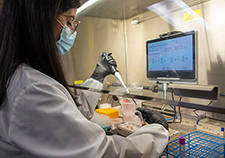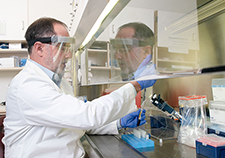Office of Research & Development |
 |


The intestines are home to hundreds of species of bacteria. New research suggests that antibiotics may disrupt bacteria in the gut in a way that increases the risk of diabetes. (Illustration: ©iStock/Dr_Microbe)
February 14, 2019
By Mitch Mirkin
VA Research Communications
"Adding the potential risk of diabetes to this scale may further tip the balance in favor of caution and stewardship."
Adding to a growing body of evidence linking antibiotic exposure to diabetic risk, a study from the VA New York Harbor Healthcare System shows that Veterans with a history of antibiotic use are more likely to develop Type 2 diabetes.
The results appear in the February 2019 issue of the journal Primary Care Diabetes.
The study, which analyzed data on more than 14,000 Veterans seen in VA primary care over an 11-year period, only points to an association between antibiotics and diabetes. It does not prove cause and effect. But the researchers say a causal link is plausible from a biological standpoint, given how antibiotics disturb bacteria in the gut.
“There is strong experimental evidence from animal studies showing that the gut microbiome is vulnerable to dramatic changes in the distribution of species [of bacteria] when exposed to antibiotics,” says senior author Dr. Mark Schwartz. “Some of these changes can be permanent. And these changes, in turn, are linked to metabolism. This has been shown to lead to obesity, diabetes, and metabolic syndrome in animals. So I think there’s a strong biological argument here.”

Dr. Mark Schwartz examines Marine Corps Veteran Andrew Serrels at the VA New York Harbor Healthcare System. Schwartz's research focus is diabetes prevention. (Photo by Claudie Benjamin)
Schwartz is a physician-researcher with VA and New York University. He’s also a professor in the department of population health at NYU.
The internist is quick to emphasize the lifesaving nature of antibiotics. “We live much longer now, in large part because of the ability of these drugs to cure infections.”
But like many in the medical community, he is working to stem the tide of overreliance on antibiotics. The trend has spawned deadly “super bugs” that resist treatment. Despite campaigns in recent years urging doctors and other health care providers to be more cautious in how they prescribe the drugs, research shows that about 1 in 3 prescriptions for antibiotics are inappropriate. For upper respiratory infections, the ratio gets worse: 1 in 2.
“The vast majority of those patients [with upper respiratory infections] do not have bacterial infections, and even for the ones that do, it’s not certain we’re doing more good than harm by prescribing antibiotics,” says Schwartz.

AI to Maximize Treatment for Veterans with Head and Neck Cancer

VA researcher works to improve antibiotic prescribing for Veterans

VA’s Million Veteran Program played crucial role in nation’s response to COVID-19 pandemic

VA Further Develops Its Central Biorepository: VA SHIELD
Antibiotics per se are effective only against bacteria, not viruses. As many as 9 in 10 upper respiratory infections are thought to be caused by viruses.
A small handful of epidemiological studies outside of the U.S., such as one from Denmark and one from an Israeli group that used U.K. data, both published in 2015, had begun to explore the antibiotic-diabetes connection before Schwartz’s group began their work on the question. The new VA study is among the first U.S. database studies published on the topic.
Schwartz’s team used VA’s Central Data Warehouse to examine medical records and health care utilization data on patients who had received primary care at the VA New York Harbor Healthcare System between 2004 and 2014. They excluded those with any prior history of diabetes. They traced which Veterans developed diabetes during the study period—as indicated by a diabetes diagnosis, or prescriptions for drugs used only to treat diabetes.
Out of 14,631 included in the study, 1,413 developed diabetes.
More than two-thirds of the Veterans in the study had been prescribed one or more courses of antibiotics. The researchers found that any exposure to antibiotics—even one course during the 11-year study period—statistically raised the odds of diabetes, by 13 percent. For several classes of antibiotics, more exposures translated to greater diabetes risk. For most classes, higher average daily doses of the medications also raised diabetes risk.
While the researchers tried to control for as many variables as they could, Schwartz acknowledges other factors may have confounded the results. In other words, it could be that the Vets who developed diabetes were more likely to have taken antibiotics, but it wasn’t the drugs themselves that elevated their risk.
One possibility is that having prediabetes—a condition in which blood sugar is elevated, but not to the point of full-blown diabetes—may weaken the immune system and make people more susceptible to infections. That would mean that the same Veterans who eventually developed diabetes would have incurred more infections in the years leading up their diagnosis—and presumably would have used more antibiotics.
Schwartz elaborates on another feasible scenario: “It’s entirely possible that it’s the underlying infection, and not the antibiotic, that increases diabetes risk—especially if the infection is intestinal, perhaps, or respiratory, where much of our microbiome live.”
His team hopes to tease that out in further research. They are now examining a larger sample of patients, from VA primary care clinics across the country.
“It may not be possible to fully tease that apart, but we’re doing stratified analyses,” says Schwartz. “We’re looking at what the indication for the antibiotic was—what type of infection. We can then look at patterns across infections to try and determine the impact of the infection itself.”
Using the nationwide VA data will also enable Schwartz’s group to drill down deeper into the different types of antibiotics. The initial study using only the New York data has already pointed to some differences between the drugs—in terms of how they affect diabetes risk—that may have clinical significance. With greater numbers of antibiotic exposures and incident diabetes cases to compare, they may be able to glean more insight to help guide treatment.
“If we can better define those differences in a national study,” says Schwartz, “we may be able to help physicians make more nuanced selections. If you have two drug classes that are otherwise equivalent in terms of the infection you’re treating, maybe you want to pick the one that carries a lower risk of diabetes.”
Meanwhile, he hopes the findings to date will bolster the growing antibiotic stewardship movement. He agrees there’s already a compelling rationale for doctors to ease up on antibiotics, given the proliferation of antibiotic-resistant bacterial strains, but he feels adding diabetes into the equation can further move the needle.
Schwartz draws an analogy to the antismoking movement.
“If you think about the initial studies linking smoking and lung cancer, that took a long time to lead to significant public health action and behavior change. Over time, smoking was linked to many other cancers as well. I think that strengthened the evidence and led to change. So in my mind, adding another finding about the potential risk of antibiotic overuse adds to the argument, and could further accelerate policy change.”
The VA physician says health care providers must balance competing goals: healing the patient and preventing the spread of the infection, versus “preventing the selection of resistant strains and avoiding potential complications like diabetes.”
His bottom-line advice to his medical colleagues is that they “should be cautious about prescribing antibiotics, unless they are convinced they are going to do more good than harm. Adding the potential risk of diabetes to this scale may further tip the balance in favor of caution and stewardship.”
To patients, he advises: “Partner with your doctor in preserving antibiotics for when they’re most appropriate and necessary. Ask your doctor, is this antibiotic really needed?”
Ultimately, Schwartz says, “it’s still an individual decision that physicians and patients need to make.”
VA Research Currents archives || Sign up for VA Research updates